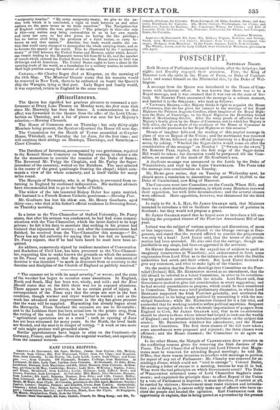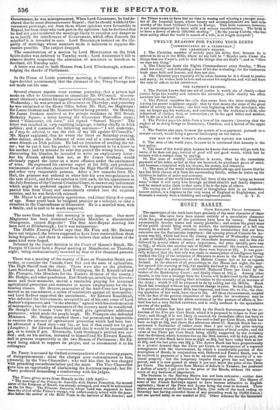POSTSCRIPT.
SATURDAY NIGHT.
Both Houses of Parliament resumed business, after the holydays, last night ; and Royalty engaged their attention. First, the King of Hanover took the oaths in the House of Peers, as Duke of Cumber- land ; and seated himself on the Ministerial side, by the Duke of Wel- lington.
A message from the Queen was introduced to the House of Com- mons with ludicrous effict. It was known that there was to be a Royal message, and it was assumed that it was one on the state of Ire- land. Sir ROBERT PEEL announced the message in a solemn manner, and handed it to the SPEAKER; who read as follows : "VICTORIA REorbui.—Her Majesty thinks it right to acquaint the House of Commons, that she has given her consent to the marriage of her Royal Highness the Princess Augusta Caroline, eldest daughter of his Royal High- ness the Duke of Cambridge, to his Royal Highness the Hereditary Grand Duke of Mecklenburg-Strelitz. After the many proofs of affection for her Majesty's family given by the House of Commons, and to which her Majesty is fully allive, she has no doubt of the readiness of the House of COIMROnd to make a suitable provision for her Royal Highness on this occasion."
Shouts of laughter followed the reading of this nuptial message in place of one on Repeal of the Union ; and the merriment was renewed when Mr. HOME followed up the official preliminary to a Royal honey- moon, by asking, "Whether the Sugar-duties would come on after the consideration of the message" on Monday? [" Sweets to the sweet."] Sir ROBERT PEEL replied, that the first stage of the Sugar-duties Bill would be taken ; but discussion would be postponed till the Com- mittee, on account of the death of Mr. Goulbura's son.
A duplicate message was announced to the Lords by the Duke of WELLINGTON, and read by the LORD CrtaNcELEon. The Peers take the message into consideration on Tuesday.
Mr. HOME gave notice, that on Tuesday or Wednesday next, he should move a resolution to discontinue the pension of 21,000/. to the Duke of Cumberland, now King of Hanover.
The Commons went into Committee on the Canada Wheat Bill ; and there was a short desultory discussion, in which some Members renewed their opposition, but with little determination ; and the several clauses were affirmed. More opposition, however, was threatened for the third reading.
In reply to Sir A. L. HAT, Sir JAMES GRAHAM said, that Ministers intended to introduce a bill to facilitate the endowment of parishes in Scotland ; but they would not propose a grant.
Sir JemEs GRAHAM stated that he hoped soon to introduce a bill em- bodying the postponed clauses of the Poor-law Amendment Bill of last year.
Ireland was the subject of various questions and discussions, of more or less importance. Mr. Ross alluded to the Orange outrage at Dun- gannon and stated that the reward offered to convict the perpetrator was only 6d. a head ! Lord Elm's said, that the terms of the procla- mation had been amended. He also said that the outrage, though un- justifiable in any shape, had been exaggerated in the accounts.
Sir HENRY BAnmoN alluded to the expedition of soldiers to quell an imaginary insurrection at Waterford ; and endeavoured to force some explanation from Lord Eliot as to the information on which the Dublin authorities had acted, and their orders. But Lord ELIOT declined to give any statement, and tried to make light of the blander.
On the motion that the House should go into Committee on the Poor- relief (Ireland) Bill, Mr. REDINGTON moved as an amendment, that the bill should be referred to a Select Committee, in order to its considera- tion by gentlemen conversant with the details. Lord ELIOT said, that Government desired to give full consideration to every suggestion; and he had several amendments to propose, which could be best considered in Committee. There was a brief preliminary discussion, in which Lord BERNARD supported the Irish Poor-law generally, and attributed the dissatisfaction to its being made political by connecting it with the mu- nicipal franchise ; while Mr. HAMILTON claimed for it a fair trial, and contended that its working tended to soften political asperities. Sergeant MURPHY having alluded to the wholesale importations of paupers from England to Cork, Sir JAMES GRAHAM said, that more consideration should be shown to those whose labour had helped to increase the wealtla of England ; and he promised to introduce a provision on the subject this session. Mr. REDINGToN withdrew his amendment, and the House went into Committee. The first three clauses of the bill were taken; some amendments were proposed and rejected; the three clauses were affirmed ; and the House resumed; the Committee to sit again on Friday.
In the other House, the Marquis of CLANRICARDE drew attention to the conflicting reasons given for removing the Irish Justices of the Peace. The Lord Chancellor of Ireland told Lord F french that Magis- trates must be removed for attending Repeal meetings; he told Mr. O'Hea, that there was no intention to interfere with meetings to petition for repeal of any act of Parliament : Mr. Clanchy was removed for at- tending a dinner, which could not " tend to outrage "; Colonel Butler, for sending a letter of excuse to a meeting, because he was ill in bed. What were the real principles on which Government acted? The Duke of WELLINGTON reiterated some of Lord Chancellor Sngden's state- meats; and explained the principle thus : to effect Repeal of the Union by a vote of Parliament is hopeless ; it must therefore, if carried at all, be carried by violence ; Government must resist violence and intimida- tion ; and in doing so, it cannot safely make use of officers who have ext. cited the people and headed the agitation. Earl FORTE8C1719 took the opportunity to explain, that in being quoted as a precedent by the pleseut Government, be was misrepresented. When Lord-Lieutenant, be had de- clared that he must discountenance Repeal ; that he should withhold Go- vernment patronage, not from those whose opinions were favourable to Repeal, but from those who took part in the agitation : but he declared that he had not yet considered the meetings likely to occasion any danger so as to justify the interference of Government, which often foments the mischief it is intended to cure. Lord Baononara insisted on the ilie• gality of meetings whose numbers made it ludicrous to suppose dis- cussion possible. The subject dropped.
The consideration of a motion by Lord MONTEAGLE on the Irish Spirit-duties was deferred to Tuesday week ; Lord ABERDEEN'S bill to remove doubts respecting the admission of ministers to benefices in Scotland, till Tuesday next.
A letter was read to both Houses from Lord Ellenborough, acknow- ledging the thanks of Parliament.



























 Previous page
Previous page